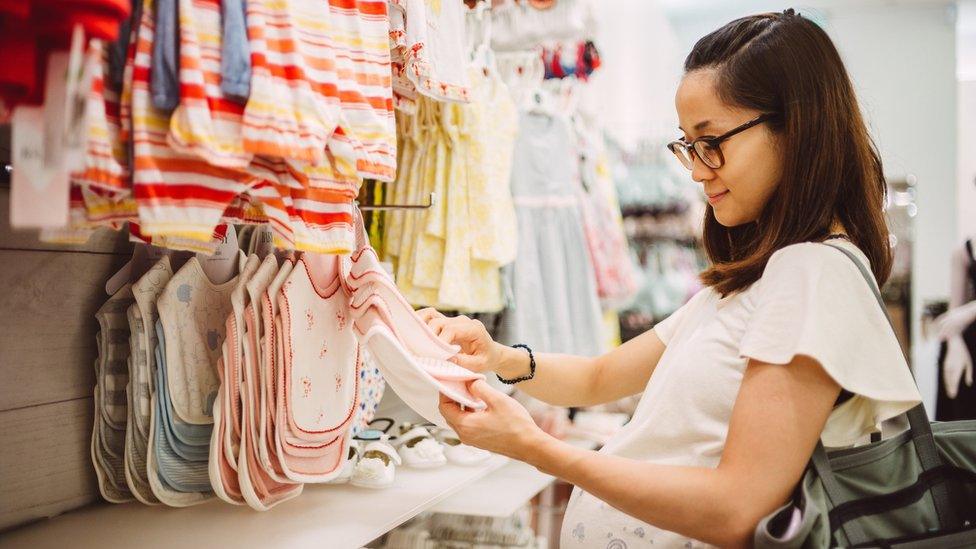Next warns weaker pound could prolong cost of living pressures
- Published
- comments

Next has warned that the weaker pound seen in the wake of the mini-budget could prolong cost of living pressures.
The retailer said that most clothing and homeware factories price their goods in dollars, meaning costs were likely to continue rising next year.
It also cut its profit and sales targets for 2022, predicting shoppers would spend less as prices rose.
The High Street giant now expects profits of about £840m this year, versus a previous forecast of £860m.
It comes as other fashion retailers including Boohoo and H&M also warn they are being hit by rising costs.
Next said that trading in August had been "below our expectations", external and that the pressure on shoppers at the tills was likely to "rise" in the coming months, ahead of the key Christmas period.
It added that prices for its autumn and winter ranges were already up by an average of 8% this year compared with 2021, as it has had to pass on extra costs to customers.
Next also expects to see similar rates of inflation - the rate at which prices rise - for its spring and summer ranges next year. UK prices in August were 9.9% higher than they were 12 months ago.
The group said, however, it has seen some costs, such as freight and logistics, ease in recent months.
Next, which is widely seen as one of the most steady High Street performers, said that it had enjoyed a stronger than expected first half of the year with full price sales up 12.4% in comparison with last year.
Its profit before tax for the six months to July climbed 16% to £401m.
Next, which has a chain of about 500 stores in the UK, suggested that the weaker sales during August could have been down to the heatwave following its summer sale, more customers taking holidays abroad after travel restrictions had eased, and concerns around higher prices starting to build.
Lord Wolfson, Tory peer and boss of Next, said that the retailer was hoping to "see benefits from recent government measures" like the energy price guarantee, although it was "too early to tell" if they might boost consumer spending.
"There are so many variables at play - energy, freight, employment, tax, economic migration, exchange rates... Today, more than ever, it is not possible to predict the future on the basis of the past," he said.

Fast fashion retailer Boohoo has cut its profit expectations as customer spending slows
In its statement, Next also said that weakness in the pound - which touched an all-time low against the dollar earlier this week - could persist into 2023 and would "serve to inflate selling prices, particularly in the second half of the year".
Next warned that it could even see prices get worse in the second half of next year.
Richard Hunter, head of markets at Interactive Investor, said that a downgrade of profits by Next was "a rare and unwelcome development, even if it is largely understandable in the circumstances".
But he said that the group was aware of the challenges it is facing as a group, as well as the retail sector and economy in general.
"For all its good work", he said there was cause for caution over the cost of living, rising interest rates and a more cost-conscious consumer.
Other retailers being hit
As shop prices across the UK soared this month, fellow fashion retailer H&M also reported weaker-than-expected profits, citing slower spending by customers and rising costs.
The Swedish fashion giant also said it would need to make cost savings after winding down its business in Russia.
The firm will now make cost savings of £166m ($180 million) annually after its earnings fell by 86% between June and August.
On Thursday, H&M boss Helena Helmersson said the retailer did not plan to pass on its rising costs to customers.
"We have chosen not to fully compensate for the increased costs, which is reflected in the gross margin," she told analysts.
Online fast fashion retailer Boohoo also cut its profit expectations on Wednesday as inflation continued to slow consumer spending. The company's market value has slumped by 87% in the last year.
"Performance in the first half was impacted by a more challenging economic backdrop weighing on consumer demand," said John Lyttle, the chief executive at Boohoo.
Meanwhile, pub chain Mitchells & Butlers said on Thursday that its customers were also facing extra "cost pressures", while its energy and utility costs have risen to £150m this financial year.
But it said that like-for-like sales, which strip out the effect of pub openings and closures, were up by 1.5% in the three months to 24 September compared with the same period in 2019.
Related topics
- Published24 March 2022

- Published17 April 2022
